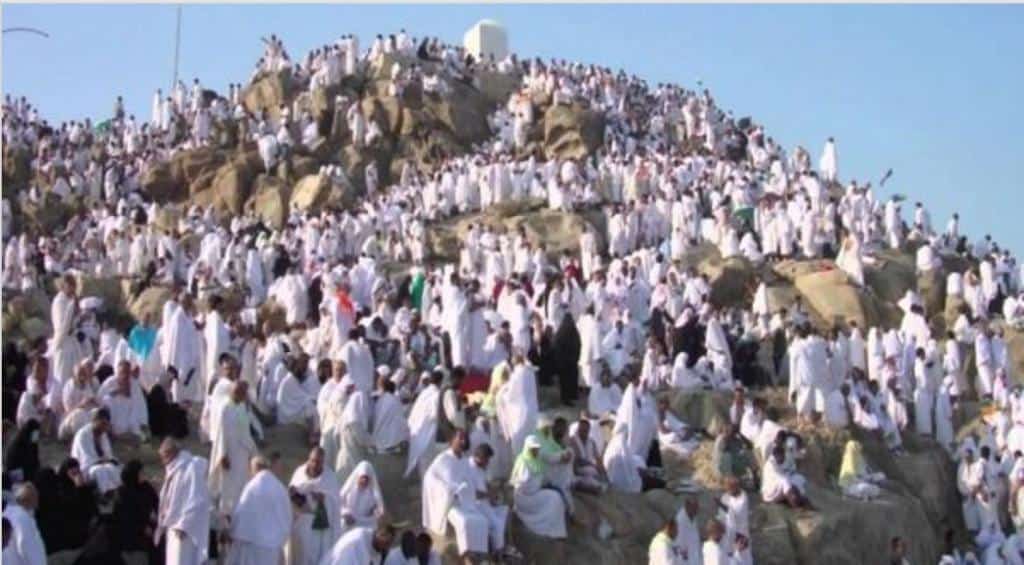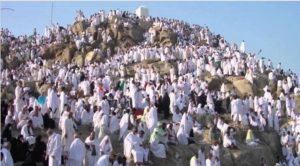Hajj reflections 6 – Day of Arafah

The Day of Gathering
 Stopping (wuquf) at Arafah is a crucial part of Hajj. Hajj is not accepted if this part was missed. It is one of the 3 pillars or fards of Hajj. The pillars are: Ihram, Wuquf at Arafah and tawaf al-Ifada. If any of these are missed, or there is a mistake in them, it is impossible to rectify it and the Hajj is not accepted. There are an additional 6 wajibs (obligations) in Hajj. however, can be rectified if a mistake is made in them. The Prophet (peace be on him) went from Mina to Arafah on Yawm Arafah, which is like the Day of Gathering. On that day, everyone who came into existence since Adam (peace be on him) til the Day of Gathering will be assembled, and waiting. Just as the pilgrims will be waiting for the sun to set, on the Day of Gathering people will be waiting and waiting and waiting. Some will have beads of sweat on their foreheads whilst others will be drowning in sweat up to their knees or waist, depending on their sins, oblivious to their nakedness and everyone around them.
Stopping (wuquf) at Arafah is a crucial part of Hajj. Hajj is not accepted if this part was missed. It is one of the 3 pillars or fards of Hajj. The pillars are: Ihram, Wuquf at Arafah and tawaf al-Ifada. If any of these are missed, or there is a mistake in them, it is impossible to rectify it and the Hajj is not accepted. There are an additional 6 wajibs (obligations) in Hajj. however, can be rectified if a mistake is made in them. The Prophet (peace be on him) went from Mina to Arafah on Yawm Arafah, which is like the Day of Gathering. On that day, everyone who came into existence since Adam (peace be on him) til the Day of Gathering will be assembled, and waiting. Just as the pilgrims will be waiting for the sun to set, on the Day of Gathering people will be waiting and waiting and waiting. Some will have beads of sweat on their foreheads whilst others will be drowning in sweat up to their knees or waist, depending on their sins, oblivious to their nakedness and everyone around them.The wait
Allah The Almighty says:On a Day the duration of which is fifty thousand years. (70:4)Abu Hurairah (may Allah be pleased with him) reported that the Messenger of Allah (peace be on him) said:
Any person who possesses gold or silver and does not pay what is due on it (i.e., the Zakat); on the Day of Resurrection, sheets of silver and gold would be heated for him in the fire of Hell and with them his flank, forehead and back will be branded. When they cool down, they will be heated again and the same process will be repeated during the day the measure whereof will be fifty thousand years. (This would go on) until Judgement is pronounced among (Allah’s) slaves, and he will be shown his final abode, either to Jannah or to Hell. (Bukhari)People will be waiting on the same ground but the time will be different for different people. For believers it will feel like the time it takes to pray two rakats whilst for others it will feel like days or years.
Imam Ahmad and Ibn Hibban narrated on the authority of Abu Said Al-Khudri (may Allah be pleased with him) that the Prophet (peace be on him) said ‘On a Day the duration of which is fifty thousand years’ (70:4) It was said to him: ‘What a long day!’ Then he said (peace be upon him): ‘By the One who’s my soul is in His hand, it will be very light and short for the believer, lighter than an obligatory prayer.’
The intercession of the Prophet (peace be on him)
Allah Almighty will give Muslims something on the Day of Gathering and they will be pleased with it. Anas bin Malik, (may Allah be pleased with him) said: The Prophet Muhammad (peace be on him) talked to us saying, ‘On the Day of Resurrection, people will surge with each other like waves, and then they will come to Adam and say, ‘Please intercede for us with your Lord.’ He will say, ‘I am not fit for that but you’d better go to Abraham as he is the Khalil of the Beneficent.’ They will go to Abraham and he will say, ‘I am not fit for that, but you’d better go to Moses as he is the one to whom Allah spoke directly.’ So they will go to Moses and he will say, ‘I am not fit for that, but you’d better go to Jesus as he is a soul created by Allah and His Word.’ (Be: And it was) they will go to Jesus and he will say, ‘I am not fit for that, but you’d better go to Muhammad.’ They would come to me and I would say, ‘I am for that.’ (Bukhari)Connecting
The core of Arafah is your connection with Allah Almighty.The Prophet (peace be on him) said, ‘Hajj is Arafah.’ (Tirmidhi)Why did he not say this about tawaf or sa’ee? In Arafah there is nothing! It is just a plain land with mountains. This strips you of anything between you and Allah Almighty.
Being and having nothing
You should have full tawheed and connection with Allah Almighty. Feel like you are nothing – humble yourself, forget about everything, feel like the dust. Ask Allah Almighty to accept you and to forgive you. When there is a vacuum inside you, who do you go to? Allah Almighty. Allah Almighty wants you to feel that you have nothing. All that we have is from Him Almighty. He wants you to leave everything behind and go to Him. He is saying ‘I am the One Who gave you these things, luggage etc. and can take them at any time. He Almighty is asking us to supplicate to Him. Be very careful not to let anything ruin your Hajj, such as enmity or envy. This journey is a journey to test your patience. You need to develop your connection with Allah Almighty to give you tranquillity and serenity in your heart. If this connection is interrupted by something you don’t like, have patience and maintain the tranquillity. Don’t let the interruption affect the serenity in your heart. Allah Almighty will test your patience. You are here only to seek Allah Almighty’s pleasure, so obey His commands fully and be obedient.The best dua
The Prophet (peace be on him) said: The best dua is the dua of Arafah. (Muwatta’ Malik) لَا إِلَهَ إِلَّا اللهُ ، وَحْدَهُ لَا شَرِيكَ لَهُ ، لَهُ الْمُلْكُ وَلَهُ الْحَمْدُ ، وهُوَ عَلَى كُلِّ شَيْءٍ قَدِيرٌNone has the right to be worshipped except Allah, alone, without partner. To Him belongs sovereignty and all praise and He is over all things omnipotent.
‘I am at Your service’
Much of the time, during Hajj you recite the talbiyah. The first word of the talbiyah, ‘Labbaik’ means ‘Here I am, at Your service’, which is the same as your reply when your parents call you. Surah Mulk mentions that Allah Almighty created the universe and all that is in it. It all belongs to Him Almighty. Your brains, muscles, jobs, money, health, everything that enabled you to perform Hajj are all amanah (trust) from Him. The means and efforts that you used to get here i.e. job, money, annual leave, time are all from Allah Almighty. So we are declaring:‘Everything is from You (Allah), the blessings are from You and we have nothing.’It literally exposes you to all that is around you. Allah Almighty chose you to come there; you are responding to His call. The talbiyah ends in the same manner as it started by declaring the Oneness of Allah Almighty:
‘You have no partner’
Having everything when you have nothing
In ‘The Wisdoms’ by Ibn Ata’illah there is a special section at the end talking about intimate discourse between him and Allah Almighty:‘My Lord what did he find who lost you and what did he lose who found you.’This is a very deep statement and paradox: When you are connected with Allah Almighty, even if you have nothing, you have everything. And when you are not connected with Allah Almighty, even if you have everything, you have nothing. We can feel this meaning in the talbiyah. Sovereignty, Kingdom, ownership belong to Allah Almighty, we are just trustees and we will be questioned about this trust. When we read the talbiyah we can see that it is very comprehensive. So repeat it and it instils this beautiful meaning which connects you with Allah Almighty in your heart. It is a deep connection. Not just a superficial one. Hence, the Prophet (peace be on him) chose the talbiyah as the slogan for Hajj as it encompasses all this.
Muzdalifah
After sunset you leave Arafah and go to Muzdalifah where you pray Maghrib and Isha together, collect pebbles and sleep. The main thing in Muzdalifah is to stick together and not start making your own way. Stay up in Muzdalifah only as much as you can or else performing rituals the next day will be difficult. Arafah is about being fully connected with Allah Almighty and forgetting about the dunya (although you can ask for the dunya in the supplications that you make). Related Posts Shaykh Haytham Tamim – Tafseer Class 4th July 2022- Connection and self-discovery
- Alone yet united
- Sincerity and obedience
- Transformation and tests
- Choosing between your will and Allah’s
- Waiting, being and having nothing
- Focus and forgiveness
- Emerging from humiliation
- Goodness from pain
- Have deep trust
Recommended Posts

The truth is more powerful than lies
July 26, 2024

Global IT outage. When systems go down…
July 19, 2024

